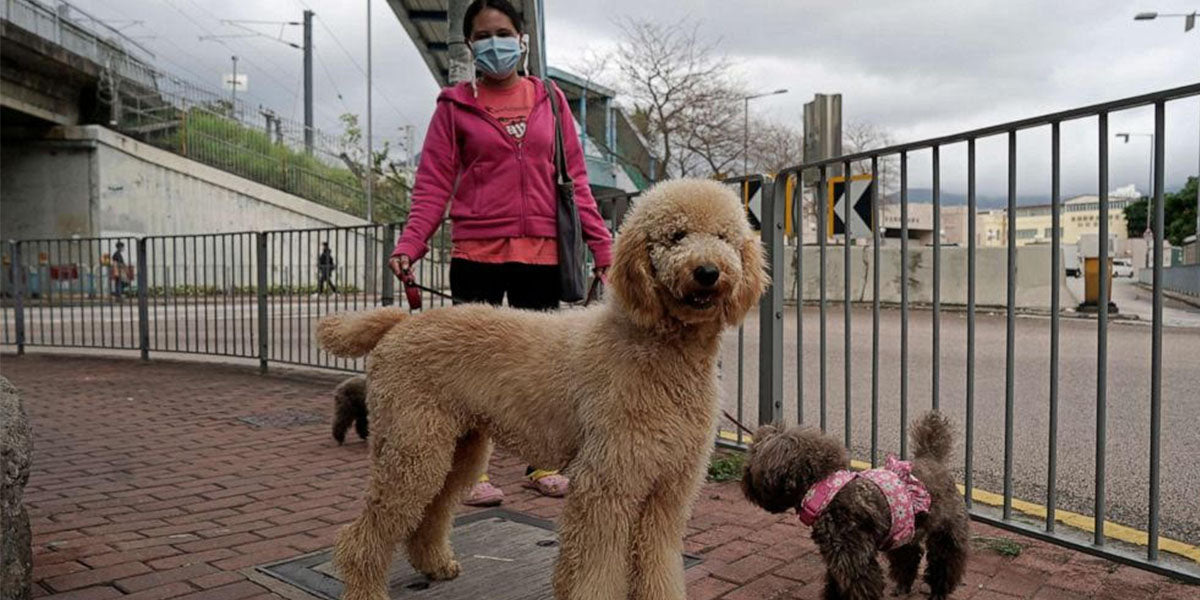Can dogs and cats get the corona virus (COVID-19)?
At this time, experts believe it is extremely unlikely. The World Health Organization currently advises that there is no evidence to suggest that dogs or cats can be infected with the new coronavirus. The OIE states there is no evidence that dogs play a role in the spread of this disease or that they become sick. The CDC also seconds that opinion, stating that, “At this time, there is no evidence that companion animals including pets can spread COVID-19.

There have been a few reports of companion animals (dogs and cats) testing positive for the virus that causes COVID-19. Are pets at risk, and could they give the virus to people?
Experts believe that dogs and cats are not easily infected with this virus, and the risk of transmission to humans is negligible compared to the risk of human-to-human transmission. As of April 2, all major health organizations, including the Centers for Disease Control and Prevention (CDC), the World Health Organization (WHO), and the World Organisation for Animal Health (OIE) say that there is no evidence that a companion animal has transmitted the virus that causes COVID-19 to a person.
Authorities strongly recommend that owners wash their hands before and after handling animals, their food, or their supplies and that people avoid kissing pets.
Veterinarians and human health officials will continue to monitor this situation as the COVID-19 pandemic evolves.

Is there a COVID-19 vaccine for dogs and cats?
There is no vaccine for COVID-19 for people or animals at this time.
Veterinarians are familiar with other coronaviruses. Similar but different coronavirus species cause several common diseases in domestic animals. Many dogs, for example, are vaccinated for another species of coronavirus (Canine Coronavirus) as puppies. However, this vaccine does not cross protect for COVID-19.
If I am diagnosed with COVID-19, how do I protect my pet?
To protect other people and yourself, the CDC recommends that you restrict contact with pets if you are sick with COVID-19, just as you would restrict your contact with other people. Avoid snuggling, being kissed or licked, and sharing food. If you must interact with your pet, wash your hands before and after, and wear a face mask.
Should my pet wear a face mask in public?
No. Face masks may not protect your pet from disease transmission and may cause other breathing difficulties.

Should I wear a face mask?
Updated April 1: N95 respirators, and any other medical-grade face masks (such as surgical face masks), should be reserved for human medical personnel only, as ordered by the Surgeon General of the United States. N95 masks, when properly fitted and worn, are the only masks that will block transmission of SARS-CoV-2, the coronavirus responsible for COVID-19.
Updated April 5: CDC recommends wearing cloth face coverings in public settings where other social distancing measures are difficult to maintain (e.g., grocery stores and pharmacies) especially in areas of significant community-based transmission.
Will the COVID-19 have any impact on food safety?
Because domestic animals cannot contract the virus, there is no threat to food safety.
Sources:
https://www.who.int/emergencies/diseases/novel-coronavirus-2019/advice-for-public/myth-busters
https://www.cdc.gov/coronavirus/2019-ncov/faq.html
https://www.cdc.gov/coronavirus/2019-ncov/about/prevention-treatment.html
https://www.cdc.gov/coronavirus/2019-ncov/prepare/animals.html


